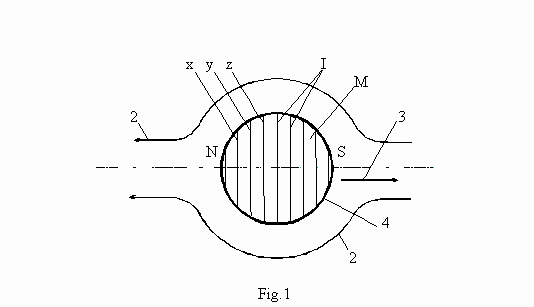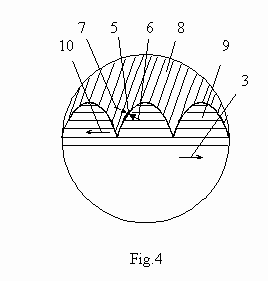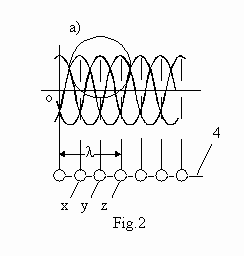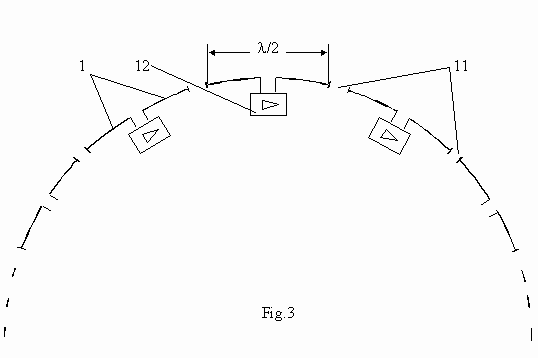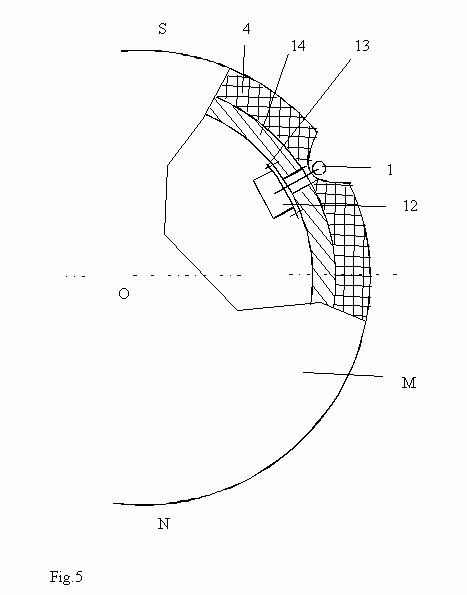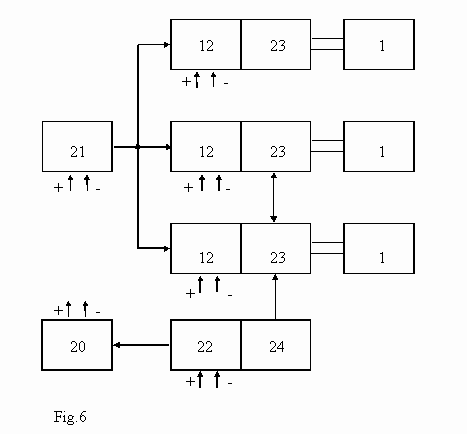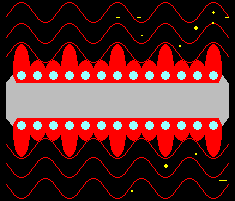-
The
fluenic motor is a propulsion system of aircraft ships. Although the title
of the invention contains the notion „motor", it has nothing in common
with the mechanics of motors with inner or external combustion. It belongs
exclusively to the electronic physics.
-
The
place of the fluenic motor in the technical reality.
-
Each
environment (aggregation state of the matter) has its own propulsion system,
established by its physical properties and forms the terrestrial, maritime,
air and space transport. A propulsion system has two essential parts:
-
A.
Force, or action, with movable role.
-
B.
The road, the environment, with reference role, of support and interaction
partner of the force.
-
Between
those two parts there compulsory exists an intermediate,
that makes the interaction of force with the road compatible –
an interface.
-
From
this point of view, the differentiation of propulsion systems makes exactly
the interface, as follows:
-
·
the solid environment, mechanical action, wheel interface
-
·
liquid environment, mechanical action, interface – water jet;
-
·
gase environment, mechanical action, interface – gas jet;
-
·
cosmic environment, mechanical action, interface – gas jet.
-
But,
the cosmic environment can´t be compatible with the interface of the atmospheric
environment!
-
The
cosmic environment has no own propulsion system!
-
Here
is the place of the fluenic motor.
-
The
aerospace propulsion system – the fluenic motor
-
A.
Force, action – electronic.
-
B.
Road – cosmic field (fluen).
-
The
interface – the antenna gets variable electric charges and releases electromagnetical
waves. The elaboration of this propulsion system was possible after the
identification of the quality of „road" for the cosmic space – fluen.
The notion fluen (energetic fluid) includes all field notions, as its
hypostasis. Fluen is much more defined in the work „The matter junction
of the infinite?
-
The
fluenic motor has no moving pieces.
-
The
fluenic motor is a suitable electronic propulsion system.
-
The
fluenic motor exercises its electromagnetic propulsion force on the entire
external surface of the mobile, spacial to the infinite.
-
Practically
it is spoken about a spheric (or of other form) capsule, a mobile that
interactions with the „road", with that really everywhere existing
environment (where the electromagnetic spectra manifests itself), through
a network of fluenic disturbances (electromagnetical), rigidly arranged
on the entire external surface of the mobile – the interface of this propulsion
system. We further give the composition and functioning of some alternatives
for experimental realization of this invention, by using the drawing in
the fig. 1… 6, that are:
-
·
Fig.1, a general sketch of the mobile (M), with the arrangement of the
propulsion network on the external case (4) composed of rings (I).
-
·
Fig.2., a drawing that represents the incorporation of the
antenna (1), (sections in the rings x, y, z) in the case (4) of the mobile
(M) and the projection on the graph of the set of generated waves.
-
·
Fig.3., the scheme of connections of a power amplifier (12)
with its charge – the antenna (1), in order to form a ring (I).
-
·
Fig.4 the detail a) to the graph in fig. 2, where it is emphasized in
a theoretical way the phenomenon of the motor (5).
-
·
Fig.5. The mobile (M), mounting detail – 1 antenna;
4 isolating case; 14 case of metal with the functions: resistance structure,
mounting support for the amplifiers, reflector for the antenna, protection
shield against radiations.
-
·
Fig.6, energetical installation – block scheme – 1 antenna; 12 power amplifier
x, y, z; 20 source of supply with electrical energy (accumulator); 21
reference frequency generators; 22 command block; 23 phase changers; 24
electronic switcher, activates a phase shifter blocking the other one
and vice-versus, making the two groups of amplifiers (rings) to send to
the antenna, either in normal stage (blocked phase shifter), either phase
shifting (active phase shifter), commanding the propulsion in front or
to the back.
-
The
fluenic motor isn´t a compact object, detachable, it is a set of fixed
functional elements, inbuilt in the structure of the mobile´s shell (M)
and that generate the propulsion force.
-
This
set includes:
-
·
the mobile (M) Fig. 5;
-
·
a reference frequency generator (21)
-
·
a power amplifier (12) with its charge – the antenna (1);
-
·
accumulators (20 Fig. 6
-
The
mobile (M) with isolating shell (4) and metallic case (14) do have the
role of support Fig.5. The reference frequency generator (21) and the
power amplifier (12) aren´t given in detail, being an optional problem
of the electronics engineer, they being widely used in lots of other scopes
(radar, handy, etc.). The actual electronics posesses lots of schemes
and procedures of realizing and processing of frequency, divider, multiplier
of frequency, power amplifier, filters, phase shifters, PLL loops, etc.
The electronics engineer is in the measure to choose the solutions most
fitted in order to get at the antenna the needed parameters: frequency,
phase and power.
-
REALIZATIONS
-
Once
the power amplifier (12) fixed with the antenna, in resonance with the
used freuqency, it is fixed on a metallic case (14), fig.5, in thousands
of identical samples, while the antenna (1) that is segmented by electric
conductors, electronic vibrators are mounted on the shell (4) fig.5, stretched
under the form of rings (I), fig,3, concentrical with the axe of symmetry N-S of the mobile
(M) fig.1. Such a ring, composed of the putting into series of the antenna
(1) behaves like a ring spira, passed in phase and frequency by the current
injected in each antenna by the amplifier.The rings (I) are disposed in
the order of the phases x, y, z, that repeat consecutively on the shell
(4) of the mobile (M) from N to S fig.1, the distance between rings being
a third of the length of the used wave (centimeter). The differentation
of rings in the three phases is done by the calibration of the phase on
one of the positions x, y, z, at the moment of the energies´ transfer
into the antenna. It is understood, that the electronics engineer establishes
the moment of phase shifting, as a method of coupling the antenna. The
totality of such disposed antennas form the network of the mobile´s propulsion
(M) – the interface of this propulsion system Practically,
the interface is the essence of this propulsion. To the amplifiers there
is brought the reference frequency from the reference generator (21) fig.
6 and the supply current from the accumulators (20).
-
FUNCTIONING
-
To
the coupling of supply, the generator (21) send the reference frequency
to the amplifiers (12), that processes it, amplifies it in current and
voltage, and at the transfer to the interface calibrates it on one phase
x, y, z (120º between phases).
-
INTERFACE
FUNCTIONING
-
The
interface transforms the gotten parameters - frequency, phase and power
– in electromagnetic waves (fluenic disturbances) of the same frequency.
As the rings (I) adequate to the phases x, y, z receive the impulses shifted
in phase fig.2, and the distance between them being a third of the wave
length, the succession of the polarity of the electromagnetic field induced
in each ring (I), generates the phase wave (9) with the direction change
of place (10) fig.4. Under the above given conditions, the speed of the
phase wave (9) shall be the propagation speed of the electromagnetic waves
– light speed. Increasing very little the frequency, the speed of the
phase wave (9) tends to exceed the light speed. As fluen (8) behaves like
a rigid solid at this interaction speed, like the wave (9), there appears
the reaction force (7) as electromagnetic repulsion force, as response
to the force (6) of the wave (9), at the try of exceeding the light speed.
But the force (6) is even the action of the rings (I), respectively of
the antenna (1) that shall take over the reaction force from the fronts
(5) of the wave (9), realizing the propulsion in sense 3. The described
phenomenon is ocurring in all the networks of the antenna (interface)
that covers the entire external surface of the mobile (M) and through
the electromagnetic field stimulated by the phase wave (9), is formed
of the dynamic shield (2), that interactions with the electromagnetic
space field to the infinite and realizes the propulsion, the motor force
being the phenomenon of reaction of electromagnetic repulsion on the fronts
of the wave (5). The fluenic motor, the interface of this electronic propulsion
system, exploits exactly the characteristic phenomenon to the space field,
that reflects the qualities of „road", by the electromagnetic
spectra and the dynamics of cosmic bodies. From here the compatibility of the interactions and expected efficiency.
In fact, the quality of „road" of the cosmic field is spotlighted
even by the phenomenon of the dynamic shield (2).
-
The
manifestations of the dynamic shield (2), itself a novelty, might suppose
also suppose the surprise of other phenomenon that are already encompassed:
-
·
to „hide" the mobile, at least partly, from the gravitational
point of view.
-
·
To induce in space the inertia phenomenon, in the direction of changing
the place and as a result the change of place of the mobile, as reversibility
of the two phenomenon – impulse and inertia – making the inertia controllable.
-
In
order to insure the needed handling for the pilotation of a mobile equipped
with fluenic motor is needed and enough, to group the propulsion network
in an acceptable number of modules, that shall be differentiated commanded
in power and sense phase, according to the wished handling.
-
Comparisons
-
1.
If the reactive jet of the rocket motor reaches the speed of 4 km/s, the
interface of the fluenic motor has the speed of the phase wave of 300000
km/s.
-
2.
If the rocket motor has the ratio between the force of reactive jet and
the resistance force of 1/1, that is of ma jwt = ma rocket, the fluenic
motor uses the electromagnetic force, 1040 times bigger than
the gravitational force !!!
-
3.
If the wheel, the interface of propulsion of the solid environment interactions
with the road on tenth or hundreds of cm2 (contact surface),
while the jet engine interactions with the „road" on hundreds or
thousands of m3, the interface of the fluenic motor interactions
with the spatial „road", the fluen, on a million billions of km3
only in the first second from the start!
-
4.
If the rocket motor exhausts its combustible in two minutes, the fluenic
motor might secure its electric energy needed to the propulsion even from
the cosmic space.
-
The
advantages of using the fluenic motor at the propulsion of airspace ships
might be:
-
·
superior efficiency to the one with reactive gas jet.
-
·
It perfectly yields to automatization.
-
·
The surety and easiness of piloting, without infrastructure.
-
·
The possibility and simplicity of realizing ships, from small sizes to
gigantic sizes, with the same components (fig.3).
-
·
The absence of pollution.
-
Disadvantages
-
-
for a much better efficiency of the dynamic shield (2) it is imposed the
use of the smallest possible wave lengths, that raises great technological
difficulties
regarding their generation and exploitation.
